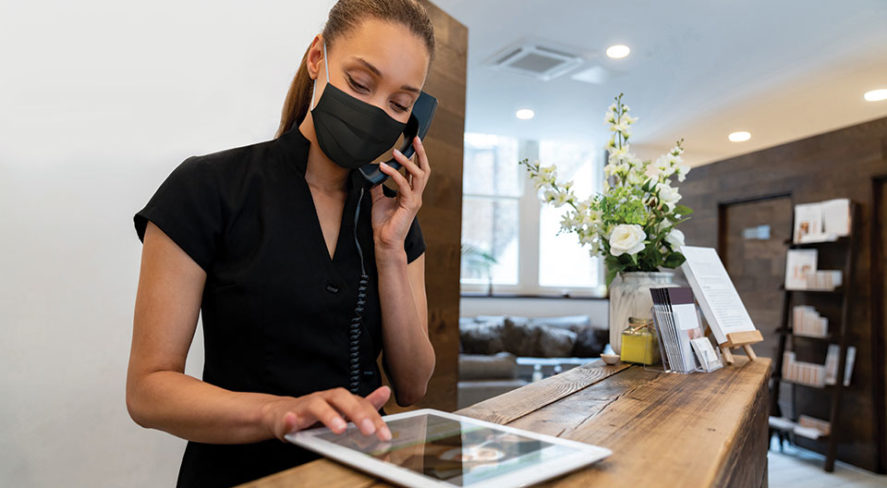Video Intercoms in a Post-Pandemic World: How Residential Security Systems Have Taken On New Functions


During the past year and a half, our homes have become much more than living spaces. They are schools, gyms, workspaces and so much more. Investing in a comprehensive security solution is as important as ever, and providers and integrators should be ready to discuss a system that not only enhances security but also offers end users ease of use. Video intercoms can provide this, in addition to the peace of mind that comes with knowing that help is only a call away.
Intercoms have been a communication staple for years, especially in the education, healthcare, workplace and residential spaces. However, we are far beyond the simple button and speaker system, or telephone, of days past. Intercoms today can serve the dual purposes of supporting the overall security of a facility while also offering a convenient way to communicate between rooms in a home or with the front desk in large housing complexes. Here are a few reasons why video intercoms are an essential component of residential facility security.
Enhanced Occupancy Management in Common Areas
Prior to 2020, many security providers might not have seen many requests for occupancy management, but as we enter a post-pandemic world, efforts to maintain social distancing may continue. As such, IP video intercoms can be used to manage occupancy in shared spaces or common areas. Entertainment rooms, conference rooms and other locations can all be equipped with IP video intercoms that require credentials for access. Additionally, some facilities might have an onsite theater for viewing movies, a gym, or a rooftop lounge area. Building managers can use an intercom system to admit tenants into these shared spaces and deny access if maximum occupancy has been reached. Integration with IP cameras means that building managers can access surveillance inside the shared spaces to ensure that occupancy has not been exceeded and, if necessary, that proper distancing measures are being adhered to.
Mobile Credentials Enhance Security and Visitor Management
Flexibility and ease of use are top of mind for residents as they find value in taking their building security into their own hands. This can be achieved through the use of IP video intercoms integrated with mobile apps. These systems can assist in managing access to condos and private living spaces, as well as common areas. For unit access, tenants want the ability to open doors remotely – a capability that is in very high demand. Not only can they manage access to their individual living space, they can also manage access to lobby doors remotely. It is not enough to just be able to speak to someone requesting access to a building or unit; tenants and building management also want to be able to see the visitor.
Facilities can equip each unit with a video intercom, or they can choose to have tenants use the mobile app to communicate with a concierge or lobby manager. Many residential facilities see a steady influx of visitors and deliveries, especially with so many residents still working from home. With this in mind, a video intercom can add the security measure of allowing tenants to use an app to oversee entry into the building lobby, from a safe distance, while confirming identification.
With mobile app communication, tenants can call down to the front desk and ask to get a vehicle out of valet, or they can request maintenance if they have a water leak or a garbage pick-up. Conversely, building staff can contact tenants to inform them of a package delivery or a visitor.
Increased Perimeter Security and Remote Monitoring
Many IP intercom systems can be monitored remotely so the provider will know if there are any issues before building management does. Having a provider monitor the health of the system also ensures that any repairs or security concerns can be dealt with swiftly.
Additionally, audit trails of access and other daily activities are kept. This is valuable to building managers since it provides them with easy access to logs from specified dates and times following an incident or security breach. For example, if someone was let into the building after hours, or if there was suspicious activity at the front door, building staff or security can access saved video footage to see who was there. An IP system can integrate with cameras and a network video recorder, offering a 24/7 security system for the building.
Cost Effectiveness and Flexibility for Tenants and Staff
With mobile access, an IP video intercom system can be deployed in a large, multi-family residential facility, as well as a smaller condo association. Installation in both scenarios offers cost effectiveness, as well as ease of move-in and move-out for building managers. With a mobile app, the tenant’s private information can be deleted from the software platform, and if there is a video intercom station inside the residence, the software can be reset for a new tenant. This eliminates the possibility of previous tenants gaining access to an apartment, without incurring the cost of having to replace key cards.
Over the past few years, it has become increasingly common for residents to outfit their homes with connected devices. From voice assistants to smart thermostats and appliances, ease and convenience of use have been in high demand. Now, as we enter a post-pandemic world, we have once again seen a shift in the technology used in our residences, only this time it has been driven by our homes taking on new functions. This has spurred more investments in security systems to keep residents and assets safe. In addition, security solutions are now almost required to serve multiple purposes. Residents and building managers alike should not have to sacrifice safety for convenience.
